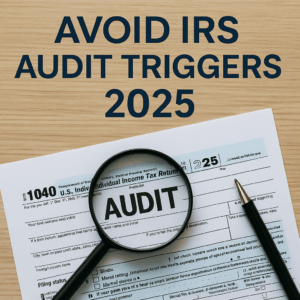
IRS Audit Triggers
How to Avoid Common IRS Audit Triggers: Tips for 2025
An IRS audit is something every taxpayer hopes to avoid. While the odds of being audited are relatively low, certain mistakes and patterns can raise red flags with the IRS. This guide explains the most common IRS audit triggers for 2025 and how you can avoid them.
What Is an IRS Audit?
An audit is when the IRS reviews your tax return to ensure that the information you provided is accurate and complete. Audits can be conducted by mail (correspondence audit) or in person (field audit), and they can range from simple requests for clarification to full reviews of your finances.
The good news? Most audits are avoidable if you understand what the IRS looks for and take care to report your income and deductions accurately.
Top IRS Audit Triggers to Watch Out For in 2025
1. Reporting Unusually High Income
While earning more money is a good thing, higher income taxpayers are more likely to be audited. According to IRS data, audit rates increase significantly for taxpayers earning $500,000 or more annually. Be extra diligent with your documentation if you’re in a higher bracket.
2. Claiming Excessive Deductions
If your deductions — such as charitable contributions, home office expenses, or medical costs — are disproportionately high compared to your reported income, it could invite scrutiny. Always ensure you have receipts and can substantiate your claims.
3. Large Charitable Contributions
Charitable donations that exceed typical percentages of income (often over 60% of adjusted gross income for cash contributions) may trigger questions. Keep acknowledgment letters and proof of payment for every donation you claim.
4. Home Office Deduction
This deduction is legitimate, but the IRS watches it closely because it’s often misused. To qualify, your home office must be used regularly and exclusively for business. A desk in your living room that you also use for personal tasks may not qualify.
5. Failing to Report All Income
The IRS receives copies of your W-2s, 1099s, and other income documents. If your return doesn’t include all income reported by third parties, the IRS’s computers will flag the discrepancy. Double-check your records and ensure all income is reported.
6. Claiming Business Losses Year After Year
If you report a business loss repeatedly, especially when it appears more like a hobby than a genuine business, the IRS may question whether you’re operating for profit. Maintain clear records showing you’re attempting to earn a profit.
7. Mismatched or Inconsistent Information
Simple mistakes — such as entering the wrong Social Security number, math errors, or inconsistent data — can result in unnecessary scrutiny. Review your return carefully before filing or use reliable tax software.
8. Offshore Accounts and Foreign Income
The IRS has increased efforts to monitor unreported foreign accounts and income. If you have overseas assets, make sure you file the appropriate forms (like FBAR or FATCA) and disclose all income properly.
9. Cash-Intensive Businesses
Businesses that deal heavily in cash, such as restaurants or salons, tend to face higher audit rates because cash transactions are harder to verify. Keep meticulous books and deposit income regularly into your business account.
10. Random Selection
Even if you do everything right, the IRS does conduct random audits. While you can’t control this, having your records organized ensures the process goes smoothly.
The Bottom Line
While you can’t guarantee that you’ll never be audited, understanding the common audit triggers and filing carefully can minimize your risk. When in doubt, consult with a tax professional to help you navigate complex situations and ensure your return is accurate and complete.
Disclaimer: The information provided in this blog post is for informational purposes only and should not be construed as legal, tax, or accounting advice. Tax situations are often complex and highly specific to the individual or business. You should contact a qualified tax expert directly to discuss your particular circumstances. Nothing herein is intended to, nor does it, create an attorney-client or advisor-client relationship. For individual guidance, please contact us directly.


